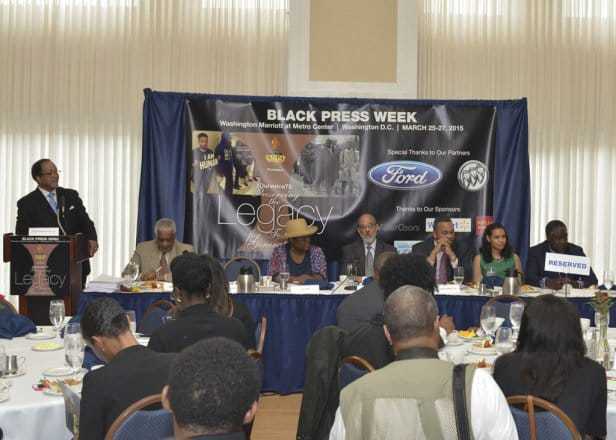
by Freddie Allen, Senior Washington Correspondent
WASHINGTON (NNPA) – Jordan Shanks, a sophomore English major at Howard University admitted that before Black Press Week, he didn’t know much about the Black Press or the Richmond Free Press, the Black newspaper published in the Virginia city where he grew up.
“The state of the Black Press is impacted by the generation gap between the older folks and the younger folks,” said Shanks.
Members of the Black community, young and old, believe that bridging that gap will be critical to the future of the Black Press. Despite myriad challenges facing the Black Press, Benjamin F. Chavis, Jr., president and CEO of the National Newspapers Publishers Association (NNPA), a federation of more that 200-Black owned newspapers, said that 188-year legacy of African American newspapers remains strategically important, insightful, indigenous and impactful.
“The challenge for us today, however, is to have a greater sense of economic accountability and economic equity and parity with those companies that are the profit beneficiaries of the trillion dollar consumer spending of [Black] people in the United States and throughout the world,” said Chavis.
“What is the state of the Black Press in America and in the world today? It is financial assessment time,” said Chavis. “The Black Press needs to be financially more sustainable and profitable.”
Chavis and others also echoed Shanks’ concerns about the generational and cultural gaps preventing young people from engaging with the Black Press. E.R. Shipp, an associate professor and journalist-in-residence at Morgan State University in Baltimore, said that shortly after she began teaching a course on Black media at the school, she showed her students the documentary “The Black Press: Soldiers without Swords,” then she tasked them to start tracking Black newspapers online.
“Oh, my God, my students didn’t find too much to be impressed with,” said Shipp. “After seeing all of this glorious past, they saw a very disappointing present,” said Shipp. “Too many people involved in the Black Press today think that they are living that glorious past and they are not being real about what’s happening now.”
Many students have never heard of the Black Press, said Shipp.
“The challenge is not just to celebrate what has gone before, to celebrate that legacy, but to actually do something to make sure that the Black Press is known by the younger generation, embraced by the next generation, and eventually taken over by the next generation,” said Shipp. “But right now, I say the state of the Black Press is shaky as far as reaching beyond those who have grown up in the Black Press.”
Jake Oliver, former chairman of the NNPA and publisher of The Afro-American newspapers, said that there’s a demographic challenge that the Black Press needs to address.
“We seemed to get distracted by our quest to go after the dollars and we forget that we also have to go after readers,” said Oliver. He said that the playing field for newspapers has never been more level and that taking advantage of social media will be the key to capturing market share in the new digital news delivery space.
Oliver added that his staff at the Afro has grappled with social media for eight years, but saw a breakthrough about two years ago when Facebook started to allow users to “like” articles from their cell phones. The number of “likes” on the Afro’s Facebook page jumped from 15,000 to 100,000 in a month, said Oliver. Now, the Afro’s Facebook page is closing in on 430,000 “likes” Oliver said, adding that the Afro also has 11,000 Facebook followers in India.
“I’m excited about what we’re about to do,” said Oliver. “Within the next 3-5 years, if not sooner, some startling innovations, not only technologically, but also as a result of some of the programs that the NNPA is about to promote and create, will form a foundation so that we can reconnect all segments of the community in a way that has never been done before.”
Chavis recommended developing new revenue streams, including a leased photographic images service, similar to Getty Images, mounting regional polling services to take advantage of the upcoming 2016 election cycle, and launching a national public awareness campaign on criminal justice reform.
Shanks suggested that Black newspaper publishers show a greater willingness to engage in what’s going on with the younger generation through social media, especially through student government associations at Black colleges. Shanks said that a negative experience with a reporter in the mainstream media influenced him to change his major from communications to English, but that he’s reconsidering a career in journalism after Black Press Week.
“[Black Press Week] taught me that you can be authentic in journalism and still tell the story,” said Shanks. “It’s about finding the audience that wants to hear it and the publication that wants to put it out.”
The upcoming 75th NNPA annual convention in Detroit, Mich., will also feature “the first day totally dedicated to uplifting, mentoring, and encouraging our youth to prepare for leadership and entrepreneurship” in the Black Press, said Chavis. He added, “We have come a mighty long way from Freedom’s Journal [the nation’s first Black newspaper] to today. We have made progress. But we still have a long journey ahead.”

